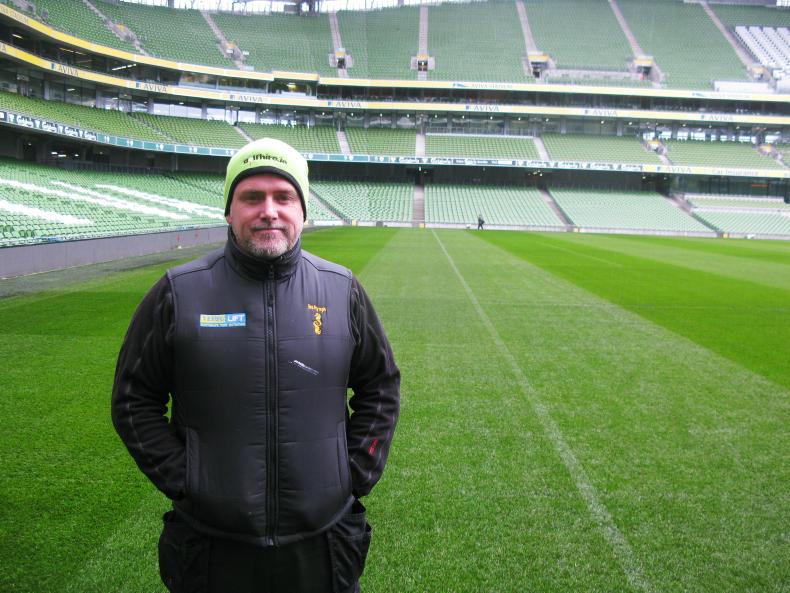It’s not a job, it’s a calling,” says Majella Smyth, the man in charge of the pitch that’s home to Irish soccer and rugby.
Majella Smyth has been working at Lansdowne Road for 23 years. After finishing his studies in the Botanic Gardens and furthering his knowledge through networking in England and across Europe, Majella spent five years as a green-keeper before joining the ground staff at Lansdowne Road in 1994. From then, Majella worked his way through the ranks and he is now head groundsman at the 51,750 capacity Aviva Stadium.
The Pitch
After three attempts, Majella is now very happy with the pitch in the stadium.
“It’s a desso grass master hybrid and we are in our fifth season with it,” Majella says. The pitch is 8,712m2 in size and it is 97% grass and 3% synthetic. It has a soil depth of 300mm to the gravel raft and a fully automatic underground heating and sprinkler system.
What puts this pitch one step above the rest is the remarkable attention to detail that Majella and his team give it. Even a task as simple as walking across the pitch has its own requirements.
“You always walk on the bright bands of grass. Walking along the dark nap will show footprints and it’s all about presentation from the start,” Majella told the Irish farmers Journal as we took a walk across the surface.
Managing such a high-profile pitch comes with its challenges and Majella says the technology and techniques in the industry are constantly changing and improving.
“For me, you just have to keep on top of things. You can’t let yourself go stale. Every so often you have to go back to basics if there is a problem, but it’s about being organised and knowing what to do and when to do it.”
Workload
When the Irish Farmers Journal visited the Aviva Stadium, Majella and his three-man-strong team were busy preparing the pitch for the Ireland V Wales World Cup qualifier. Bearing in mind this game came six days after the Ireland V England Six Nations match, the grounds team had a staggeringly short time-frame in which to prepare the pitch – especially with a transition between two sports to deal with.
“We started work on the pitch the night after the rugby. We had stripped everything out, taken the posts down and removed the logos, which meant those job were out of the way,” Majella recalls. “Then on Sunday we removed the lines, repaired the pitch and put out the grow-lights. By Tuesday we had everything marked out for the soccer and a double cut was carried out on the pitch,” he added. Majella’s plan for Thursday and Friday was to get two more markings done, get the goal posts up and pitch values taken.
The grounds team are no strangers to putting in the hard graft, often working long hours into the night just to meet their deadline.
“Between the Oman soccer match and the American football, we worked until 3am trying to get the turnover right.”
With such a big game only days away, one would assume the head grounds man would feel some sort of pressure in the build-up. But Majella doesn’t feel the pressure anymore: “Once the pitch goes live, you’re in the limelight – there’s nowhere to hide. But I’m 23 years doing this, I’m used to it,” he says. “Knowledge is power. It’s about knowing the system and the rest of the lads know my system here.”
Concerts
“Concerts are a necessary evil. They have to pay the bills. Sometimes the plan for other pitches allows them to turf-in and turf-out between concerts, but that’s their business plan. That won’t work here though, especially for rugby – it will just break up,” Majella says.
“For concerts, we kill the pitch off. Then we tease out all of the dead grass and vegetation. All that’s left are the synthetic fibres. After the concert we will seed the pitch back in and the challenge is to grow the grass in a very short turnaround.
Happy Moments
“Happy moments are when I walk the pitch after a game and see how it has played. I’d be my own worst critic but other lads wouldn’t be long telling you if the pitch wasn’t playing to its best either,” he says.
The Irish Farmers Journal asked Majella would he be able to watch the upcoming Irish soccer match in peace? With a laugh, he replied: “No. I’ll always watch the pitch. I normally watch games in the canteen or in my office and I’ll do a bit of reading. If there is a problem, they will come knocking on the door.”











SHARING OPTIONS